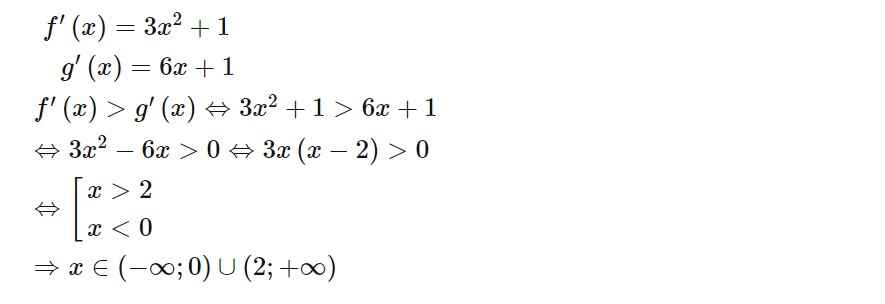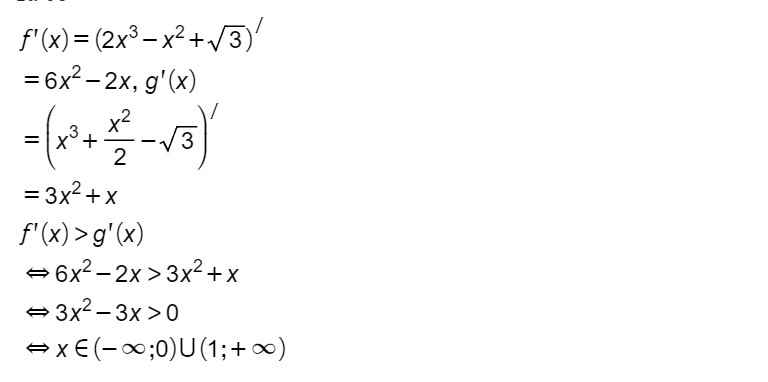Hãy nhập câu hỏi của bạn vào đây, nếu là tài khoản VIP, bạn sẽ được ưu tiên trả lời.

Lời giải:
a) Ta có f'(x) = 3x2 + 1, g(x) = 6x + 1. Do đó
f'(x) > g'(x) <=> 3x2 + 1 > 6x + 1 <=> 3x2 - 6x >0
<=> 3x(x - 2) > 0 <=> x > 2 hoặc x > 0 <=> x ∈ (-∞;0) ∪ (2;+∞).
b) Ta có f'(x) = 6x2 - 2x, g'(x) = 3x2 + x. Do đó
f'(x) > g'(x) <=> 6x2 - 2x > 3x2 + x <=> 3x2 - 3x > 0
<=> 3x(x - 1) > 0 <=> x > 1 hoặc x < 0 <=> x ∈ (-∞;0) ∪ (1;+∞).

a/ \(\lim\limits_{x\rightarrow\sqrt{2}}f\left(x\right)=\lim\limits_{x\rightarrow\sqrt{2}}\frac{\left(x-\sqrt{2}\right)\left(x+\sqrt{2}\right)}{x-\sqrt{2}}=\lim\limits_{x\rightarrow\sqrt{2}}\left(x+\sqrt{2}\right)=2\sqrt{2}\)
\(\Rightarrow\lim\limits_{x\rightarrow\sqrt{2}}f\left(x\right)=f\left(\sqrt{2}\right)\Rightarrow\) hàm số liên tục tại \(x=\sqrt{2}\)
b/ \(\lim\limits_{x\rightarrow5^+}f\left(x\right)=\lim\limits_{x\rightarrow5^+}\frac{x-5}{\sqrt{2x-1}-3}=\frac{\left(x-5\right)\left(\sqrt{2x-1}+3\right)}{2\left(x-5\right)}=\lim\limits_{x\rightarrow5^+}\frac{\sqrt{2x-1}+3}{2}=3\)
\(f\left(5\right)=\lim\limits_{x\rightarrow5^-}f\left(x\right)=\lim\limits_{x\rightarrow5^-}\left[\left(x-5\right)^2+3\right]=5\)
\(\Rightarrow\lim\limits_{x\rightarrow5^+}f\left(x\right)=\lim\limits_{x\rightarrow5^-}f\left(x\right)=f\left(5\right)\Rightarrow\) hàm số liên tục tại \(x=5\)

Bạn tự hiểu là giới hạn tiến đến đâu nhé, làm biếng gõ đủ công thức
a. \(\frac{\sqrt{1+x}-1+1-\sqrt[3]{1+x}}{x}=\frac{\frac{x}{\sqrt{1+x}+1}-\frac{x}{1+\sqrt[3]{1+x}+\sqrt[3]{\left(1+x\right)^2}}}{x}=\frac{1}{\sqrt{1+x}+1}-\frac{1}{1+\sqrt[3]{1+x}+\sqrt[3]{\left(1+x\right)^2}}=\frac{1}{2}-\frac{1}{3}=\frac{1}{6}\)
b.
\(\frac{1-x^3-1+x}{\left(1-x\right)^2\left(1+x+x^2\right)}=\frac{x\left(1-x\right)\left(1+x\right)}{\left(1-x\right)^2\left(1+x+x^2\right)}=\frac{x\left(1+x\right)}{\left(1-x\right)\left(1+x+x^2\right)}=\frac{2}{0}=\infty\)
c.
\(=\frac{-2}{\sqrt[3]{\left(2x-1\right)^2}+\sqrt[3]{\left(2x+1\right)^2}+\sqrt[3]{\left(2x-1\right)\left(2x+1\right)}}=\frac{-2}{\infty}=0\)
d.
\(=x\sqrt[3]{3-\frac{1}{x^3}}-x\sqrt{1+\frac{2}{x^2}}=x\left(\sqrt[3]{3-\frac{1}{x^3}}-\sqrt{1+\frac{2}{x^2}}\right)=-\infty\)
e.
\(=\frac{2x^2-8x+8}{\left(x-1\right)\left(x-2\right)\left(x-2\right)\left(x-3\right)}=\frac{2\left(x-2\right)^2}{\left(x-1\right)\left(x-3\right)\left(x-2\right)^2}=\frac{2}{\left(x-1\right)\left(x-3\right)}=\frac{2}{-1}=-2\)
f.
\(=\frac{2x}{x\sqrt{4+x}}=\frac{2}{\sqrt{4+x}}=1\)


\(x^2+1>x^2\Rightarrow\sqrt{x^2+1}>\sqrt{x^2}\)
Và \(\sqrt{x^2}=\left|x\right|\)
\(x+\left|x\right|=\left\{{}\begin{matrix}0;\left(x\le0\right)\\2x;\left(x>0\right)\end{matrix}\right.\)
Cả 2 trường hợp đều cho kết quả ko âm, do đó ta luôn có \(x+\left|x\right|\ge0\)